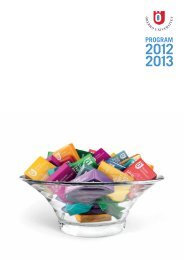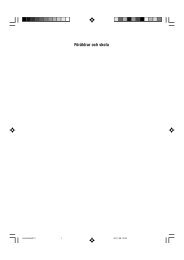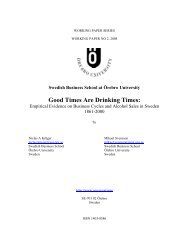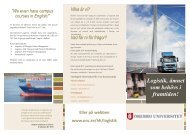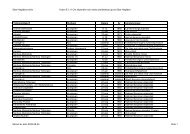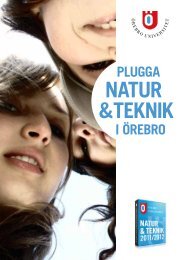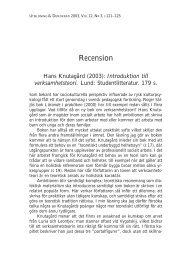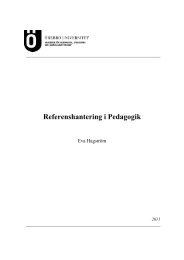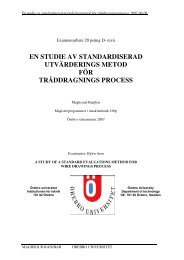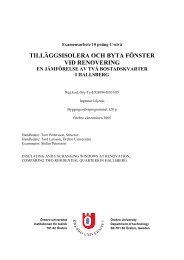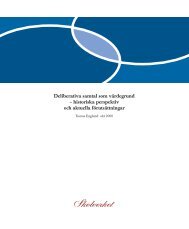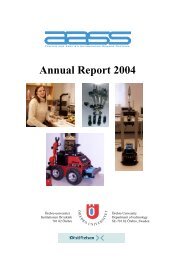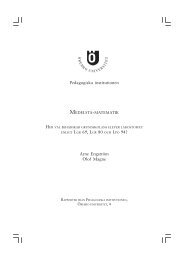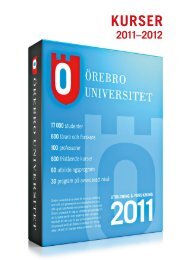Annual Report 2002 - Ãrebro universitet
Annual Report 2002 - Ãrebro universitet
Annual Report 2002 - Ãrebro universitet
Create successful ePaper yourself
Turn your PDF publications into a flip-book with our unique Google optimized e-Paper software.
2 AASS – Center for Applied Autonomous Sensor Systems<br />
Summary<br />
The Applied Autonomous Sensor Systems Center (AASS) organizes all research and graduate<br />
education in the area of Autonomous Systems and also is responsible for the undergraduate<br />
and MSc programs in Computer Engineering (Datateknik) at the Dept. of Technology, at<br />
Örebro University in Örebro, Sweden. The research effort has a pronounced interdisciplinary<br />
character being a fusion of a variety of disciplines from Systems and Control, Measurement<br />
Science and Sensors, Computer Science and Artificial Intelligence, and Operations Research<br />
but, with emphasis on Fuzzy Systems, Intelligent Control and Sensors, Machine Learning,<br />
Planning and Automated Reasoning, and Biologically Inspired Systems.<br />
The Applied Autonomous Sensor Systems Center is organized in four laboratories,<br />
responsible for research and graduate education in their respective areas:<br />
1. Biologically Inspired Systems Laboratory (BIS)<br />
2. Mobile Robotics Laboratory (MR)<br />
3. Intelligent Control Laboratory (IC)<br />
4. Learning Systems Laboratory (LS)<br />
The common research focus for the four research laboratories is the subject of perception and<br />
autonomy in diverse un- and/or semi-structured environments. This subject is pursued using a<br />
common research methodology, which is strictly applied: all technologies under investigation<br />
should answer actual needs that emerge from an application, and their effectiveness is always<br />
validated on the application. Applications considered by AASS include mobile platforms,<br />
e.g., mobile robots, and immobile platforms, e.g., industrial plants and processes.<br />
This report presents AASS organization and management, developments in education,<br />
research and industrial cooperation, activities within the national/international research<br />
community, and various forms of societal interaction that have taken place in year <strong>2002</strong>. In<br />
this context the major achievements that characterize year <strong>2002</strong> are as follows:<br />
• During <strong>2002</strong> the number of Phd students has increased from 13 to 22.<br />
• A new research line on Cooperative Robotics started, which has got initial momentum by<br />
four related events: (i) a 5-year grant from CUGS (national graduate school in computer<br />
science), (ii) the employment of two new PhD students, (iii) the organization, jointly with<br />
the Technical University of Lisbon, of the First European Summer School on cooperative<br />
robotics, and (iv) our successful participation at the <strong>2002</strong> international RoboCup<br />
competition.<br />
• Lars Karlsson has been awarded a 3 year grant by Vetenskaprådet (Swedish funding<br />
agency for basic research) to work on planning and plan execution under uncertainty.<br />
• Silvia Coradeschi and Alessandro Saffiotti have been appointed guest editors for a special<br />
issue on "Anchoring" of Robotics and Autonomous Systems, one of the major journals in<br />
this field. This demonstrates the recognition, by part of the international community, of



